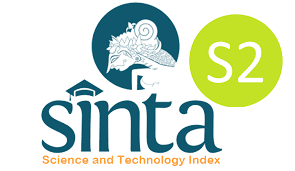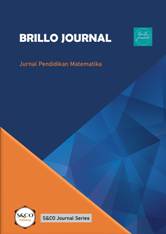Students' Problem-Solving Skills through the Modified Triangle Method with Contextual Teaching and Learning
DOI:
https://doi.org/10.56773/bj.v4i2.65Keywords:
Modified triangle method, Contextual teaching and learning, Prior knowledge, Problem-solving skills, Mathematics educationAbstract
This research was motivated by the low level of students' problem-solving ability in mathematics learning, especially based on real-world problems. The main cause is that students still have problems in understanding the meaning and finding the core of the given problem. The objectives of this study to determine the modified Triangle Method (TM) with Contextual Teaching and Learning (CTL) to improv students' ability in problem-solving and also its interaction with prior knowledge. This type of research is experimental design with a sample of 69 students grade VIII in West Sumatera, Indonesia. The data were obtained by giving the test, which was evaluated by t-test and two-way ANOVA. Based on the result test, obtained a t-value of 4.488 with the Sig.=0.000<0.05= α. It can be concluded that the modified of TM and CTL can improve students' problem-solving ability. Meanwhile, the interaction test obtained Sig.0.467>0.05=α. In other words, there is no interaction between CTL and students' prior knowledge of problem-solving skills. It means that TM and CTL can be used for students with high and low prior knowledge to improve students' problem-solving skills.
References
Adeoye, M. A., & Jimoh, H. A. (2023). Problem-Solving Skills Among 21st-Century Learners Toward Creativity and Innovation Ideas. Thinking Skills and Creativity Journal, 6(1), 52–58. https://doi.org/10.23887/tscj.v6i1.62708
Aguilar-Valdés, M., Almonacid-Fierro, A., Valdebenito, K., & Sepúlveda-Vallejos, S. (2024). Epistemological beliefs and teaching practice: A systematic literature review 2011-2021. International Journal of Evaluation and Research in Education (IJERE), 13(2), 767–773. https://doi.org/10.11591/ijere.v13i2.26063
Aisy, N. M. R., Mulyono, M., & Walid, W. (2022). Analysis of students difficulties in mathematics problem-solving ability on number pattern material. Jurnal Pijar MIPA, 17(6), 706–711. https://doi.org/10.29303/jpm.v17i6.4149
Akhtar, I. (2016). Research Design. SSRN Electronic Journal, 68–84. https://doi.org/10.2139/ssrn.2862445
Babakr, Z., Kakamad, K., & Mohamedamin, P. (2019). Piaget’s Cognitive Developmental Theory: Critical Review. Education Quarterly Reviews, 2(3). https://doi.org/10.31014/aior.1993.02.03.84
Basadur, M., Gelade, G., & Basadur, T. (2014). Creative Problem-Solving Process Styles, Cognitive Work Demands, and Organizational Adaptability. Journal of Applied Behavioral Science, 50(1), 80–115. https://doi.org/10.1177/0021886313508433
Brookhart, S. M. (2010). How to Asess Higher Order Thingking Skill in Your Classroom. ASCD.
Curry, K., Wilson, E., Flowers, J., & Farin, C. (2012). Scientific Basis vs. Contextualized Teaching and Learning: The Effect on the Achievement of Postsecondary Students. Journal of Agricultural Education, 53(1), 57–66. https://doi.org/10.5032/jae.2012.01057
Dimitriadis, G., & Kamberelis, G. (2006). Theory for Education. Routledge Taylor & Francis Group.
Guiñez, F., & González, D. (2023). The Impact of Real-World Mathematical Modelling Problems on Students’ Beliefs About the Nature of Mathematics. In G. Kaiser & G. A. Stillman (Eds.), International Perspectives on the Teaching and Learning of Mathematical Modelling (pp. 93–109). Springer, Cham. https://doi.org/10.1007/978-3-031-27115-1_6
Hamlen, K. R. (2018). General Problem-Solving Styles and Problem-Solving Approaches in Video Games. Journal of Educational Computing Research, 56(4), 467–484. https://doi.org/10.1177/0735633117729221
Hanfstingl, B., Benke, G., & Zhang, Y. (2019). Comparing variation theory with Piaget’s theory of cognitive development: more similarities than differences? Educational Action Research, 27(4), 511–526. https://doi.org/10.1080/09650792.2018.1564687
Hasani, A. (2016). Enhancing Argumentative Writing Skill through Contextual Teaching and Learning. Educational Research and Reviews, 11(16), 1573–1578. https://doi.org/10.5897/ERR2016.2806
Hélie, S., & Sun, R. (2010). Incubation, insight, and creative problem solving: A unified theory and a connectionist model. Psychological Review, 117(3), 994–1024. https://doi.org/10.1037/a0019532
Hsieh, C. Y. (2018). Developing Design through a Creative Problem-Solving Process: A Group Community Art Project. International Journal of Art and Design Education, 37(3), 541–553. https://doi.org/10.1111/jade.12155
Kadir, K. (2016). Statistika Terapan. PT Rajagrafindo Persada.
Kale, U., & Akcaoglu, M. (2020). Problem Solving and Teaching How to Solve Problems in Technology-Rich Contexts. Peabody Journal of Education, 95(2), 127–138. https://doi.org/10.1080/0161956X.2020.1745612
Kopparla, M., Bicer, A., Vela, K., Lee, Y., Bevan, D., Kwon, H., Caldwell, C., Capraro, M. M., & Capraro, R. M. (2019). The effects of problem-posing intervention types on elementary students’ problem-solving. Educational Studies, 45(6), 708–725. https://doi.org/10.1080/03055698.2018.1509785
Kostiainen, E., Ukskoski, T., Ruohotie-Lyhty, M., Kauppinen, M., Kainulainen, J., & Mäkinen, T. (2018). Meaningful learning in teacher education. Teaching and Teacher Education, 71, 66–77. https://doi.org/10.1016/j.tate.2017.12.009
Lago, J. M. L., & Cruz, R. A. O. Dela. (2021). Linking to the real world: Contextual teaching and learning of statistical hypothesis testing. Lumat General Issue, 9(1), 597–621. https://doi.org/10.31129/LUMAT.9.1.1571
Lee, J. Y., Donkers, J., Jarodzka, H., & van Merriënboer, J. J. G. (2019). How prior knowledge affects problem-solving performance in a medical simulation game: Using game-logs and eye-tracking. Computers in Human Behavior, 99(April), 268–277. https://doi.org/10.1016/j.chb.2019.05.035
Lestari, F. P., Ahmadi, F., & Rochmad, R. (2021). The implementation of mathematics comic through contextual teaching and learning to improve critical thinking ability and character. European Journal of Educational Research, 10(1), 497–508. https://doi.org/10.12973/EU-JER.10.1.497
Malvasi, V., & Gil-Quintana, J. (2022). Beliefs, performance, and applicability of mathematics in learning for life: The multi-case study at secondary education institutes in Italy. Journal on Mathematics Education, 13(1), 51–68. https://doi.org/10.22342/jme.v13i1.pp51-68
Muhtarom, M., Sutrisno, S., Nizaruddin, N., & Murtianto, Y. H. (2024). Research on mathematical beliefs: systematic literature review. International Journal of Evaluation and Research in Education, 13(2), 693–704. https://doi.org/10.11591/ijere.v13i2.25968
Mulwa, E. C. (2015). Difficulties Encountered by Students in the Learning and Usage of Mathematical Terminology: A Critical Literature. Journal of Education and Practice, 6(13), 27–38.
Nasution, M. L., Yerizon, Y., & Gusmiyanti, R. (2018). Students’ Mathematical Problem-Solving Abilities Through the Application of Learning Models Problem Based Learning. IOP Conference Series: Materials Science and Engineering, 335(1), 0–5. https://doi.org/10.1088/1757-899X/335/1/012117
Nawas, A. (2018). Contextual Teaching and Learning (CTL) Approach Through REACT Strategies on Improving The Students’ Critical Thinking in Writing. International Journal of Management and Applied Science, 4(7), 46–49.
Pangemanan, A. (2020). Application of Contextual Teaching and Learning Approach on Statistics Material Against Student Results. International Education Studies, 13(4), 1. https://doi.org/10.5539/ies.v13n4p1
Pinwanna, M. (2015). Using the Contextual Teaching and Learning Method in Mathematics to Enhance Learning Efficiency on Basic Statistics for High School Students. The International Conference On Language, Education, Humanities & Innovation, 21(22), 58–63.
Podolak, M., Młynarska, M., Kawałek, A., Śnieżek, W., & Napiórkowska, G. (2016). Modern Methods of Teaching – Learning Mathematicsand Related Subjects. European Union under Erasmus+.
Priyadi, H. G., & Yumiati. (2021). The Effect of Contextual Teaching and Learning (CTL) Model With Outdoor Approach Towards the Students’ Ability of Mathematical Representation. Education Quarterly Reviews, 4(3), 441–450. https://doi.org/10.31014/aior.1993.04.03.352
Putra, H. D., Setiawan, W., & Afrilianto, M. (2020). Indonesian high scholar difficulties in learning mathematics. International Journal of Scientific and Technology Research, 9(1), 3466–3471.
Rusdi, R., Made Arnawa, I., Fauzan, A., & Lufri, L. (2018). The need analysis development of mathematics learning model based realistic mathematical education and literacy in junior high school. Proceedings of the International Conferences on Educational, Social Sciences and Technology - ICESST 2018, 86–94. https://doi.org/10.29210/2018113
Sari, N. H., Sutiarso, S., & Dahlan, S. (2019). Analysis of students problem solving ability by using polya steps in linear program material. International Conference on Mathematics and Science Education, 4, 39–44.
Selvianiresa, D., & Prabawanto, S. (2017). Contextual Teaching and Learning Approach of Mathematics in Primary Schools. Journal of Physics: Conference Series, 895(1), 012171. https://doi.org/10.1088/1742-6596/895/1/012171
Sibaen, N. W., Buasen, J. A., & Alimondo, M. S. (2023). Principal components of students’ difficulties in mathematics in the purview of flexible learning. Journal on Mathematics Education, 14(2), 353–374. https://doi.org/10.22342/jme.v14i2.pp353-374
Silseth, K., & Erstad, O. (2018). Connecting to the outside: Cultural resources teachers use when contextualizing instruction. Learning, Culture and Social Interaction, 17(22), 56–68. https://doi.org/10.1016/j.lcsi.2017.12.002
Simonsmeier, B. A., Flaig, M., Deiglmayr, A., Schalk, L., & Schneider, M. (2022). Domain-specific prior knowledge and learning: A meta-analysis. Educational Psychologist, 57(1), 31–54. https://doi.org/10.1080/00461520.2021.1939700
Sinay, E., & Nahornick, A. (2016). Teaching and learning mathematics research Series I : Effective instructional strategies. Toronto District School Board.
Siniguian, M. T. (2017). Students’ difficulties in solving mathematical problems. International Journal of Advanced Research in Engineering and Applied Sciences, 6(2), 1–12. https://doi.org/10.1063/5.0120257
Siregar, R. N., Suryadi, D., Prabawanto, S., & Mujib, A. (2023). Students’ mathematics self-efficacy in learning social arithmetic topic. International Journal of Evaluation and Research in Education, 12(4), 2176–2185. https://doi.org/10.11591/ijere.v12i4.25480
Sousa, M. J., Martins, J. M., & Sousa, M. (2019). Decision-Making Processes for Effective Problem Solving to Potentiate Organisations Sustainability. European Journal of Workplace Innovation, 5(1), 119–132. https://doi.org/10.46364/ejwi.v5i1.593
Soyadı, B. B. Y. (2015). Creative and Critical Thinking Skills in Problem-based Learning Environments. Journal of Gifted Education and Creativity, 2(2), 71–71. https://doi.org/10.18200/jgedc.2015214253
Suciati, Kartowagiran, B., Munadi, S., & Sugiman. (2019). The single-case research of coastal contextual learning media on the understanding of numbers counting operation concept. International Journal of Instruction, 12(3), 681–698. https://doi.org/10.29333/iji.2019.12341a
Sudarman, S., Djuniadi, D., & Sutopo, Y. (2017). The Formation of Conservation – Based Behaviour of Mechanical Engineering Students through Contextual Learning Approach. International Journal of Environmental and Science Education, 12(4), 617–627.
Surya, E., Putri, F. A., & Mukhtar, M. (2017). Improving mathematical problem-solving ability and self-confidence of high school students through contextual learning model. Journal on Mathematics Education, 8(1), 85–94. https://doi.org/10.22342/jme.8.1.3324.85-94
Swars, S. L., Smith, S. Z., Smith, M. E., Carothers, J., & Myers, K. (2018). The preparation experiences of elementary mathematics specialists: examining influences on beliefs, content knowledge, and teaching practices. Journal of Mathematics Teacher Education, 21(2), 123–145. https://doi.org/10.1007/s10857-016-9354-y
Takunyaci, M. (2021). Investigation of Mathematics Teachers’ Self-Efficacy in Teaching Mathematics in the COVID-19 Pandemic Process. Education Quarterly Reviews, 4(2), 396–407. https://doi.org/10.31014/aior.1993.04.02.289
Univeren, D., & Karakus, G. (2020). An Alternative Approach in Constructivist Mentoring for Textual Analysis in Turkish Courses. International Education Studies, 13(2), 71. https://doi.org/10.5539/ies.v13n2p71
Yeh, C. Y. C., Cheng, H. N. H., Chen, Z.-H., Liao, C. C. Y., & Chan, T.-W. (2019). Enhancing achievement and interest in mathematics learning through Math-Island. Research and Practice in Technology Enhanced Learning, 14(1), 1–19. https://doi.org/10.1186/s41039-019-0100-9
Zhong, L., & Xu, X. (2019). Developing real life problem-solving skills through situational design: a pilot study. Educational Technology Research and Development, 0123456789. https://doi.org/10.1007/s11423-019-09691-2
Zhou, M., & Brown, D. (2017). Educational Learning Theories. In Education Open Textbooks. GALILEO, University System of Georgia. https://oer.galileo.usg.edu/education-textbooks/1
Downloads
Published
How to Cite
Issue
Section
License
Copyright (c) 2025 Dina Amsari, Salmaini Safitri Syam, Fadila Suciana

This work is licensed under a Creative Commons Attribution 4.0 International License.
The authors agree that this article remains permanently open access under the terms of the Creative Commons Attribution 4.0 International License





